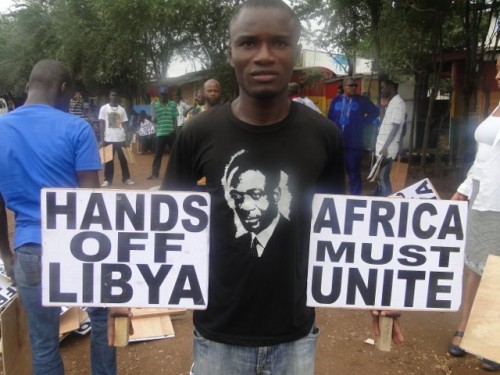
Ghanaians demonstrate against the US-NATO invasion and occupation of the North African state of Libya. These demonstrations coincide with the 102nd anniversary of the birth of Kwame Nkrumah., a photo by Pan-African News Wire File Photos on Flickr.
No Trust, No Peace
August 8, 2012: As agreed, the NTC (National Transitional Council) has handed control of the government over to the recently elected parliament. Forming a new government and running the country won't be easy. There are still dozens of major militias that refuse to cooperate, and many more armed groups that will be troublesome if they don't get their way. Attempts to disarm these groups have largely failed, as many militias are feuding with each other, and have to contend with armed criminal gangs as well. Kaddafi is now fondly remembered as a bad person who at least kept the peace.
A major reason no one can get the government going is corruption. This bribery and theft was somewhat organized under Kaddafi, but now it's a free-for-all and too much money just disappears before it can be spent on needed goods or services. NTC officials found that local leaders could not be trusted, and they would often steal much of the money they have been given for distribution to individuals and families. This lack of "civil society" (enough people willing to work for the public good without stealing or engaging in other forms of corruption) is causing widespread anger and resistance to any new national government. While tribal leaders are more trustworthy, they will also steal. But not as much as strangers and at least you know who the tribal leaders are and who they are related to. Thus the resurgence of tribal politics, for the tribe is an ancient form of government that, in chaotic times, is often the only viable alternative.
At least 30 Libyan rebel fighters have made their way to Syria and joined the rebels there. Videos of the armed Libyans in Syria have been released on the Internet.
August 7, 2012: Libya is offering to allow over half a million Egyptians to return to their jobs in Libya if Egypr will give up assets former Libyan dictator Kaddafi and his cronies stashed in Egypt. This is a tempting offer. Like all oil-rich Arab states, Libya depended on skilled foreigners for key technical jobs (especially medicine and running the oil operations) and unskilled foreigners for the dirty jobs no Libyan wanted to do (garbage collection and unskilled labor tasks). Some foreign workers have already returned, relying for safety on the assurances of the company or local government they are working for.
August 6, 2012: Mauritania refused a request to extradite Moamar Kaddafi's former intelligence chief, Abdullah al Senoussi back to Libya. Senoussi has been jailed in Mauritania, since last May, for trying to enter the country in disguise (as a Tuareg). Senoussi is wanted in Libya and France for various crimes. He is also a potential source of insider information on the Kaddafi government. It is believed that Mauritanian officials want a payoff to either extradite Senoussi or let him go free.
August 5, 2012: For the fifth time in three months a Red Cross compound (this one in Misrata) was attacked. There were no injuries, but the Red Cross halted its operations in Misrata and Benghazi (where earlier attacks had occurred). Islamic radicals are suspected as they object to the Red Cross (which is from non-Moslem countries) on religious grounds.
In Tripoli there was a brief battle in a market place as two groups fought to see who would get a prime location. One person was wounded.
South of Tripoli police tracked down some of the men responsible for seven recent bombing attempts. The three would not surrender and were killed. Police captured weapons and bomb components.
August 1, 2012: In Benghazi someone threw a bomb out of a car in an attack on military headquarters. This time the explosion did not hurt anyone. This is the third such attack on this location this year.
July 31, 2012: In Benghazi militia gunmen kidnapped seven Iranian aid workers. There were no ransom, or any other, demands made for the release of the Iranians. The militiamen only said that they were questioning the captives to see if they were in Libya to try and spread Shia Islam. Iran has the largest Shia population on the planet, but most Sunni Islamic radicals consider Shia heretics and often kill them. Iran has appealed to the UN to get its aid workers released.
Someone raided a jail in Benghazi overnight and released an Islamic terrorist.
July 29, 2012: In Benghazi, someone murdered a former senior intelligence officer, who had joined the rebels early on. There are no suspects, other than families of those who may have lost kin to the Kaddafi intelligence services. That would be a long list of suspects.
Outside the city, the convoy of a top military commander was fired on.
No comments:
Post a Comment